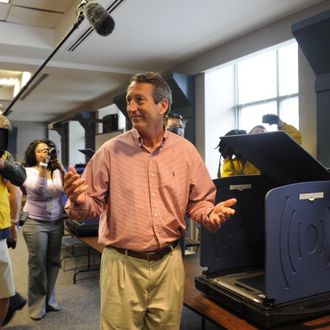
A strange thing happened to Mark Sanford on the way to his comeback victory over Elizabeth Colbert Busch in South Carolina’s special Congressional election: He became a media darling. Once the butt of Appalachian Trail and stalker jokes, a different portrait of Sanford emerged in the final days of the race, as the national reporters who flocked to South Carolina encountered a candidate who not only answered all their questions, but put them on the phone with one of his sons and even personally chauffeured them to his campaign stops. As Slate’s Dave Weigel put it after tagging along with Sanford this past weekend, “This got lost in the winds of scandal, but Sanford has an incredibly easy charm and — maybe by necessity, now — a welcoming, humble campaign style.”
It was that campaign style that ultimately sent Sanford back to Washington. Sure, the race never should have been close. In a Congressional district where Mitt Romney beat Barack Obama by 18 points, any Republican should have been a shoe-in. But after his nasty split from his ex-wife Jenny reared its ugly head again a few weeks ago in the form of trespassing charges — Sanford heads to court on Thursday — it looked like he was toast. National Republicans pulled their support and Colbert Busch soon took a nine-point lead in the polls.
In hindsight, though, Colbert Busch clearly peaked too early. What’s more, she failed to capitalize on her momentum. A first-time candidate who was already extremely guarded, once she took the lead, she tried to run out the clock, becoming even more on-message and walled-off. She spent the final weeks of the race surrounded by a coterie of aides (who shooed away reporters) and traveling through the district in a giant bus. Sanford, meanwhile, campaigned like he had nothing to lose. Just consider the two candidates’ schedules today, in the final hours of the race: Sanford made ten campaign stops; Colbert Busch voted and called it a day.
But even if Sanford hadn’t been the underdog, he almost certainly would have campaigned with the same reckless abandon. When I encountered Sanford in February on his first full day of campaigning, back when the smart money said he was going to win the race in a runaway, he seemed constitutionally incapable of playing it safe. As we sat at a bar and talked about his infidelity, his failed marriage, and his subsequent depression, as well as the nerves he said he was feeling now that he was getting back into public life, he jerked his head toward his press secretary Joel Sawyer, who was sitting just out of earshot, and said, “Joel’d probably be cringing down there if he knew our topics.”
In a way, Sanford’s extreme accessibility — combined with his penchant for introspection — is what made more trouble for him in the first place. Plenty of politicians have cheated on their wives. Sanford’s the rare pol who, after getting caught, basically put himself at the mercy of the reporters who wanted to ask him about it — and gave painfully revealing answers to boot. Yet it was that same accessibility that helped him win over not just reporters but voters in the end, too.





























